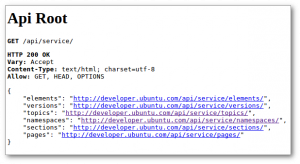 Last week I posted on G+ about the a couple of new sets of QML API docs that were published. Well that was only a part of the actual story of what’s been going on with the Ubuntu API website lately.
Last week I posted on G+ about the a couple of new sets of QML API docs that were published. Well that was only a part of the actual story of what’s been going on with the Ubuntu API website lately.
Over the last month I’ve been working on implementing and deploying a RESTful JSON service on top of the Ubuntu API website, and last week is when all of that work finally found it’s way into production. That means we now have a public, open API for accessing all of the information available on the API website itself! This opens up many interesting opportunities for integration and mashups, from integration with QtCreator in the Ubuntu SDK, to mobile reference apps to run on the Ubuntu phone, or anything else your imagination can come up with.
But what does this have to do with the new published docs? Well the RESTful service also gives us the ability to push documentation up to the production server, which is how those docs got there. I’ve been converting the old Django manage.py scripts that would import docs directly into the database, to instead push them to the website via the new service, and the QtMultimedia and QtFeedback API docs were the first ones to use it.
Best of all, the scripts are all automated, which means we can start integrating them with the continuous integration infrastructure that the rest of Ubuntu Engineering has been building around our projects. So in the near future, whenever there is a new daily build of the Ubuntu SDK, it will also push the new documentation up, so we will have both the stable release documentation as well as the daily development release documentation available online.
I don’t have any docs yet on how to use the new service, but you can go to http://developer.ubuntu.com/api/service/ to see what URLs are available for the different data types. You can also append ?<field>=<value> keyword filters to your URL to narrow the results. For example, if you wanted all of the Elements in the Ubuntu.Components namespace, you can use http://developer.ubuntu.com/api/service/elements/?namespace__name=Ubuntu.Components to do that.
That’s it for today, the first day of my UbBloPoMo posts. The rest of this week I will be driving to and fro for a work sprint with the rest of my team, the Ubuntu SDK team, and many others involved in building the phone and app developer pieces for Ubuntu. So the rest of this week’s post may be much shorter. We’ll see.
Happy Hacking.